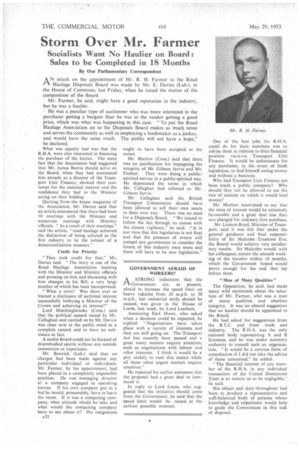Storm Over Mr. Farmer
Page 34

If you've noticed an error in this article please click here to report it so we can fix it.
Socialists Want No Haulier on Board: Sales to be Completed in 18 Months
By Our Parliamentary Correspondent
AN attack on the appointment of Mr. R. H. Farmer to the Road Haulage Disposals Board was made by Mr. E. Davies (Lab.), in the House of Commons, last Friday, when he raised the matter of the composition of the Board.
Mr. Farmer, he said, might have a good reputation in the industry, but he was a haulier.
He was a peculiar type of auctioneer who was more interested in the purchaser getting a bargain than he was in the vendor getting a good price, which was what was happening in this case. "To put the Road Haulage Association on to the Disposals Board makes as much sense and serves the community as well as employing a bookmaker as a jockey, and would have the same result. The public will not have a hope," he declared.
What was equally bad was that the
R.H.A. were also interested in financing the purchase of the lorries. The mere fact that the Association had suggested that Mr, James Barrie should serve on the Board, when they had nominated him already as a director of the Transport Unit Finance, showed their contempt for the national interest and the confidence they had in the Minister acting on their bidding.
Quoting from the house magazine of the Association, Mr. Davies said that an article announced that there had been 10 meetings with the Minister and numerous meetings with Ministry officials. " As a result of their meetings," said the article, "road haulage achieved the distinction of being selected as the first industry to be the subject of a denationalization measure."
Credit for Priority "They took credit for that," Mr. Davies said. " The story is one of the Road Haulage Association meeting with the Minister and Ministry officials and pressing on him and discussing with him changes in his Bill, a very large number of which has been incorporated.
"What a story! Was there ever so blatant a disclosure of sectional interest successfully lobbying a Minister of the Crown and achieving its interest?"
Lord Hinchingbrooke (Cons.) said that the political canard raised by Mr. Callaghan and carried on by Mr. Davies was clear now in the public mind as a complete canard and to have no substance -in fact.
A useful Board could not be formed of disembodied spirits without any outside connection or experience.
Mr, Beswick (Lab.) said that no charges had been made against any particular individual or individuals: Mr. Farmer, by his appointment, had been placed in a completely impossible position. He was managing director of a company engaged in operating lorries. If his own company put in a bid he would, presumably, have to leave the room. If it was a competing company, what attitude WOuld he take and what would the Competing company have to say about it? His resignation
A32 ought to have been accepted at the outset.
Mr. Marlow (Cons.) said that there was no justification for impugning the integrity of Mr. Gibson Jarvie and Mr. Farmer. They were doing a publicspirited service in a public-spirited way. He deprecated the terms in which Mr. Callaghan had referred to Mr. Gibson Jarvie.
Mr. Callaghan said the British Transport Commission should have been allowed to sell their own assets in their own way. There was no need for a Disposals Board. "We intend to follow the Act through its course with the closest vigilance," he said. ." It is our view that this legislation is not final and that the pressure of events will compel any government to consider the future of this industry once more and there will have to be new legislation." One of the best jobs the R.D.A. could do for their members was to advise them in relation to theiffinancial position vis-à-vis Transport Unit Finance. It would be unfortunate for any purchaser, in the event of fresh legislation, to find himself owing money and without a business.
Why had Transport Unit Finance not been made a public company? Why should they not be allowed to see the rate of interest on which it would lend money?
Mr. Marlow intervened to say that the rates of interest would be extremely favourable and a great deal less than was charged for ordinary hire purchase.
Mr. Lennox-Boyd, Minister of Transport, said it was felt that under the general guidance and final responsibility of Sir Malcolm Trustram Eve, the Board would achieve very satisfactory results. Sir Malcolm would, with his colleagues, ensure the smooth working of the transfer within 18 months, which the Government hoped would prove enough for the task that lay before them.
"Man of Many Qualities"
The Opposition, he said, had made many wild statements about the selection of Mr. Farmer, who was a mart of many qualities and absolute integrity. It was an absurd suggestion that no haulier should be appointed to the Board.
He had asked for suggestions from the B.T.C. and from trade and industry, The R.H.A. was the only national body representing A and B licensees, and he was under statutory authority to consult such an organization. "It would be a curious form of consultation if I did not take the advice of those concerned," he added.
"The financial interest of any member of the R.H.A. in any individual transaction of the United Dominions Trust is so remote as to be negligible," he said.
His object and duty throughout had been to produce a representative and well-balanced body of persons whose knowledge and -experience would help to guide the Commission in this task of disposal.




























































































